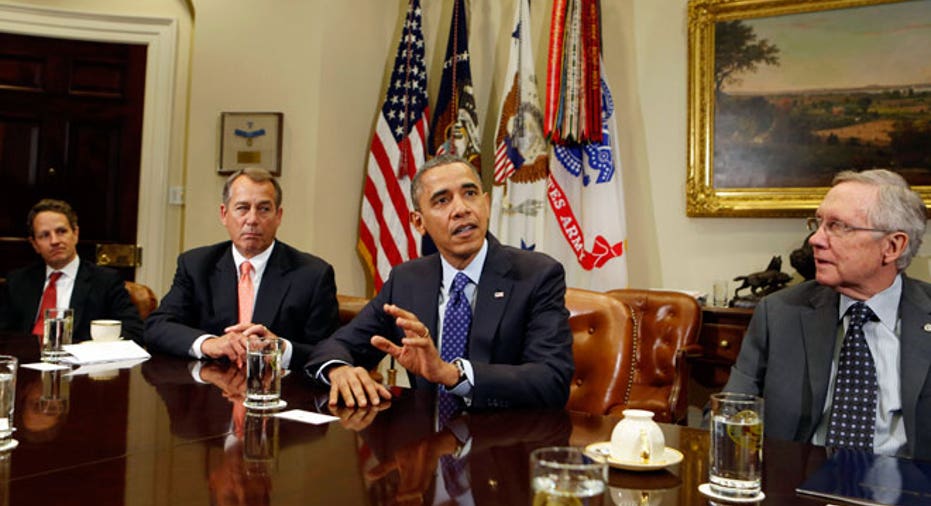The Fiscal Cliff's Impact on Small Business

The so-called "fiscal cliff" refers to an automatic $560 billion in tax increases and spending cuts that would go into effect, beginning in January 2013, to reduce the US budget deficit. These higher tax rates and slashed government budgets, negotiated as part of the "debt ceiling" debate in 2011, will go into effect if Congress does not pass a debt reduction package before the end of the year.
Elements of the new laws are distasteful to both Democrats and Republicans. President Obama is pushing for an agreement that would raise taxes on the wealthiest Americans. Republicans, seeking smaller government, want the reduction of federal spending on programs. They will have to meet somewhere in the middle.
Why is this important?
The Congressional Budget Office (CBO) warns that the automatic tax hikes and spending cuts designed to cut the deficit in half next year would be so steep that they might combine to send the country into a recession. The CBO estimates is that GDP would contract at an annual rate of 1.3% during the first half of 2013 if we do not avert going over the fiscal cliff.
Reductions would be imposed on numerous federal agencies with some exceptions, such as Social Security, Medicaid, military pay and pensions, and veterans' benefits. This could mean the closing of military bases, which would hurt small businesses as well as the local economies in areas surrounding the bases. Federal cutbacks could mean the reduction of staff and the hours of operation at national parks and historic monuments. None of these occurrences will be popular... and that's just for starters.
Tax hikes would include: • Expiration of the Bush tax cuts extended by President Obama in 2010; • Across-the-board federal spending cuts ("sequestration") as outlined by the Budget Control Act of 2011; • Return of the Alternative Minimum tax rates to 2000 levels; • Expiration of the 2% Social Security payroll tax cut; and • Imposition of new taxes that are part of the Affordable Care Act ("Obamacare").
Other unpopular consequences would be the end of unemployment benefits for thousands of out-of-work Americans and the one-third reduction of physicians' Medicare reimbursement rates from their current levels. Unemployed workers will hold onto their disposable income, rather than spend it with small businesses. Doctors, who regularly tell me they are in a cash crunch, are struggling. Many of them are taking lines of credit and other forms of short-term funding in order to keep their practices going. Reducing already below-market Medicare payments will hurt them even further. Many have had to put off upgrading their practices because they are unable to secure equipment loans or expansion loans to modernize their offices.
House Republican leaders are calling on President Obama to respond to the offer they devised this week to avert the fiscal cliff with a balanced approach that cuts spending and prevents a massive tax rate hike on small businesses. Otherwise, they want the President to put forth his own plan that can pass both houses of Congress.
“Going over the ‘fiscal cliff’ would hurt our economy and cost jobs, and people in both parties agree we need a ‘balanced approach’ to deal with our debt," said House Speaker John Boehner (R-OH) in a statement. "One thing Republicans won’t be party to is a deal that protects big businesses and preserves special-interest tax breaks while raising tax rates on the small businesses we’re counting on to create jobs... With the American economy on the brink of the fiscal cliff, we don’t have time for the president to continue shifting the goal posts. We need to solve this problem.”
Small business owners that I speak with have concerns about their cash flow if and when increased tax rates combine with the provisions of Obamacare. I believe small business owners are inherently optimistic and understand that something must be done to reduce government debt. Continued deficit spending hurts the overall economy and thereby impacts consumer spending on small businesses' products and services. Thus, many of them would be okay with a return to the higher tax rates during the Clinton era, a time period when the economy thrived.
America should avoid the drastic measures of the fiscal cliff. However, Congress and the President must act together and compromise to develop a long-term deficit plan.
This opinion column was written by Rohit Arora, co-founder and CEO of Biz2Credit, an online resource that connects small business owners with 1,100+ lenders, credit rating agencies, and service providers such as CPAs and attorneys via its Internet platform. Since 2007, Biz2Credit has secured more than $750 million in funding for thousands of small businesses across the U.S.



















